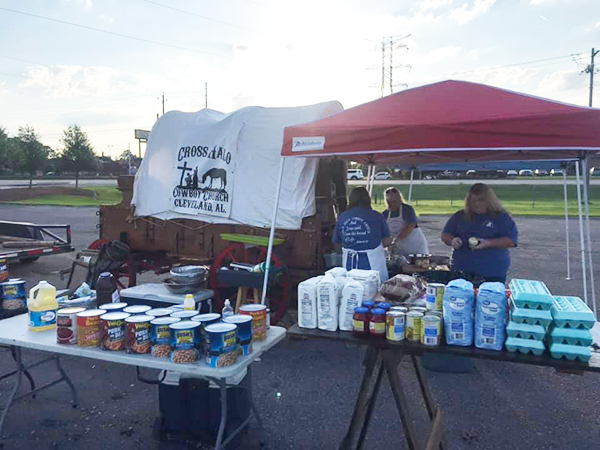Maybe 15 or 16 years ago, Phillip Gilliland went over to his daughter-in-law’s barn for what he thought was going to be a small gathering.
When he got there, he found about 70 people gathered for food, a steel horseshoe-making demonstration and a Bible study based on that visual illustration.
“This group of guys was going around from farm to farm, ranch to ranch about once a month doing this kind of thing, and my daughter-in-law’s barn was the third or fourth stop,” Gilliland said. “When I saw what they were doing I told her, ‘they don’t realize it, but what they’ve got here is a church.’”
From those first gatherings, the Cowboy Church of Marshall County was born in Albertville — Alabama’s first cowboy church. After that, a cowboy church was started in Colbert County that now runs about 500 people in attendance every week.
And it kept spreading.
Now across the state, 19 cowboy churches are affiliated with the American Fellowship of Cowboy Churches (AFCC), many of which are also part of a local Baptist association.
“It caught on pretty big here,” said Gilliland, pastor of Trading Post Cowboy Church, Woodville, and a field staff member for the AFCC.
It also caught on so big with Gilliland that he moved from the only place he’d ever lived to help start Trading Post.
“I was 59 years old, and I’d never moved in my life,” he said.
The church — planted by the Cowboy Church of Marshall County — is now a decade old. Its services, like other cowboy churches, are laid back by design. They meet in a barn (or a barn-like) building, have coffee and donuts and start 10 minutes late just because everyone’s busy talking and hasn’t gotten settled yet.
Removing barriers
“We try to find a way to remove barriers to people coming to church,” Gilliland said. “We receive people like we believe Jesus did. Nobody has to dress a certain way, and we don’t pass an offering plate — we just leave a cowboy hat in the back for people to leave an offering if they want to.”
As a result, they’ve seen a lot of people “who don’t know Genesis from Revelation” come to church and find Jesus, Gilliland said. “It’s a great experience to get to do what we do.”
The state’s cowboy churches — which have a strong presence in north Alabama but also are scattered in places like Childersburg, Clanton and Troy — also have a thriving chuck wagon ministry. With help from the sponsorship of local businesses, they take their chuck wagons anywhere people need food. In recent weeks, they’ve set up in places like thrift store parking lots to serve hot meals to thousands — meals like stew, chili, roast beef, cornbread, beans and cobblers.
“We are able to do a lot of outreach with the wagons,” Gilliland said. “Our members are passionate about this ministry and getting to cook for others.”






Share with others: